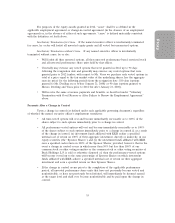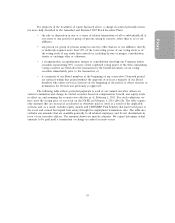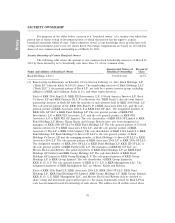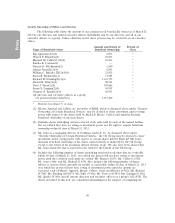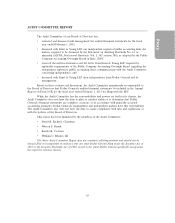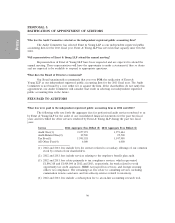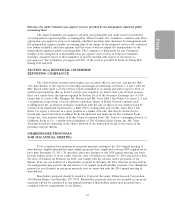Dollar General 2012 Annual Report Download - page 70
Download and view the complete annual report
Please find page 70 of the 2012 Dollar General annual report below. You can navigate through the pages in the report by either clicking on the pages listed below, or by using the keyword search tool below to find specific information within the annual report.
Proxy
What happens if an incumbent director nominee fails to receive a majority of the votes cast for his or
her election in an uncontested election?
Under Tennessee law, a director continues in office until a successor is elected and qualified,
even if the director is not reelected in an uncontested election. To address the status of a ‘‘holdover’’
incumbent director who fails to receive a majority of the votes cast for his or her election in an
uncontested election, we intend to implement a director resignation policy to be set forth in our
Corporate Governance Guidelines. This policy will require a director to tender his or her resignation
upon receiving, in an uncontested election, a greater number of votes cast against his or her election
than in favor of his or her election. The Board has adopted this policy through amendments to the
Corporate Governance Guidelines that are contingent upon and will be effective immediately following
the approval of the charter amendment by the shareholders.
Under the resignation policy, the Board, taking into account the recommendation of the
Nominating and Governance Committee, will determine whether to accept a tendered resignation. The
Nominating and Governance Committee and the Board of Directors, in making their decisions, may
consider any factor or other information that they deem relevant, including whether the ‘‘holdover’’
director’s resignation may result in any adverse impact to us, including under any NYSE or SEC board
or committee composition requirement. The Board will be required to publicly disclose its decision and
its rationale. The director who tenders his or her resignation will not be permitted to participate in
deliberations of or voting by the Nominating and Governance Committee or the Board regarding his or
her resignation.
If the Board rejects the offered resignation, the director will continue to serve until the next
annual shareholders’ meeting and until his or her successor is duly elected or his or her resignation or
removal in accordance with our Bylaws. If the Board accepts the offered resignation, or if a nominee
for director, who is not an incumbent director, is not elected, then the Board, in its sole discretion, may
fill any resulting vacancy or decrease the size of the Board, in each case pursuant to the provisions of
our Bylaws.
How would the charter amendment read?
The proposed charter amendment would amend our current charter by inserting a new
Article 10 in the form set forth below immediately following Article 9 of our current charter:
‘‘10. Except as provided in Article 9 or in the case of a contested election, a nominee
for director shall be elected by the affirmative vote of a majority of the votes cast in
favor of or against the election of such nominee by holders of shares entitled to vote in
the election at a meeting for the election of directors at which a quorum is present.
For purposes of this Article 10, ‘‘affirmative vote of a majority of the votes cast’’ shall
mean that the number of votes cast in favor of the election of such nominee exceeds
the number of votes cast against the election of such nominee; abstentions and broker
non-votes shall not be deemed to be votes cast for purposes of tabulating the vote. In
a contested election, a nominee for director shall be elected by a plurality of the votes
cast by holders of shares entitled to vote in the election at a meeting for the election
of directors at which a quorum is present. An election shall be considered ‘‘contested’’
if there are more nominees for election than positions on the Board of Directors to be
filled by election at the meeting. The determination of the number of nominees for
purposes of this subsection shall be made as of (i) the expiration of the time fixed by
the Amended and Restated Bylaws of the corporation, as the same may be amended
from time to time, for advance notice by a shareholder of an intention to nominate
directors, or (ii) absent such a provision, at a time publicly announced by the Board of
63


